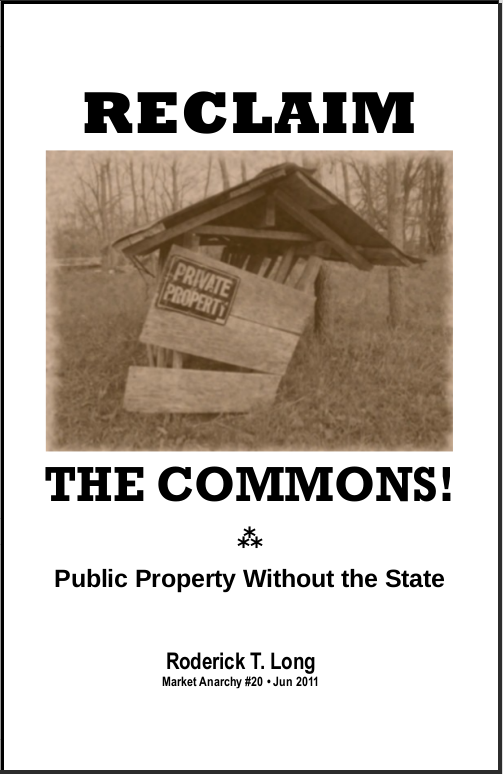C4SS has teamed up with the Distro of the Libertarian Left. The Distro produces and distribute zines and booklets on anarchism, market anarchist theory, counter-economics, and other movements for liberation. For every copy of Roderick T. Long’s “Reclaim the Commons!: Public Property Without the State” that you purchase through the Distro, C4SS will receive a percentage. Support C4SS with Roderick T. Long’s “Reclaim the Commons!: Public Property Without the State“.
$1.00 for the first copy. $0.75 for every additional copy.
An individualist anarchist analysis and defense of rights to public property — not property that belongs to government, but property that belongs to the public — you and me and our neighbors.
Libertarians often assume that a free society will be one in which all (or nearly all) property is private…. To most people, ‘public property’ means ‘government property.’ As an anarchist, I do not advocate government property of any sort. But this is not the only kind of public property. Throughout history, legal doctrine has recognized, alongside property owned by the the public as organized into a state and represented by government officials, an additional category of property owned by the unorganized public. This was property that the public at large was deemed to have a right of access to, but without any presumption that government would be involved in the matter at all. It is public property in this sense that I am defending….
It is true that private property provides a protected sphere of free decision-making – for the property’s owners. But what is the position of those who are not property owners? A system of exclusively private property certainly does not guarantee them ‘a place to stand.’ Far from providing a sphere of independence, a society in which all property is private thus renders the propertyless completely dependent on those who own property…. It is true that users of public property face a somewhat greater risk from their fellow users than users of private property do. By the same token, however, public property allows more freedom. That is why the best option is a society that makes room for both public and private property. Those who place a high value on security, and are willing to put up with burdensome restrictions in order to get it, will be free to patronize private property, while those who seek self-expression, are averse to restrictions, and are willing to put up with more risk from others will likewise be free to patronize public property….








